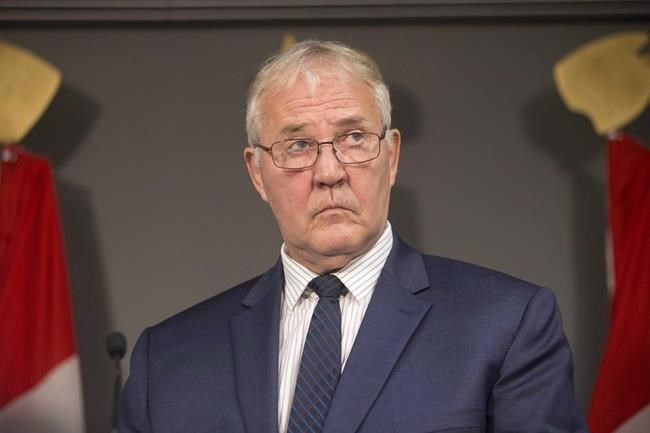
Bill Blair, federal minister of border security and organized crime reduction, attends a press conference in Toronto on Friday, August 3, 2018. Bill Blair, the new minister responsible for border security and organized crime reduction, is officially tasked with leading the charge on irregular migration. A mandate letter from the prime minister says Blair's work will be supported by the departments of Public Safety, Immigration and Foreign Affairs.
Image Credit: THE CANADIAN PRESS/Chris Young
August 29, 2018 - 8:30 AM
OTTAWA - Prime Minister Justin Trudeau has assigned sweeping responsibilities to Bill Blair, the new minister in charge of border security and organized crime, tasking him with leading the file on irregular migration and examining whether Canada should ban handguns and assault weapons.
In a freshly minted mandate letter made public Tuesday, the prime minister asks Blair to lead conversations with the United States on the Safe Third Country Agreement, working closely with Foreign Affairs Minister Chrystia Freeland and Immigration Minister Ahmed Hussen.
The agreement stipulates that asylum seekers are required to make their refugee claims in the first "safe" country in which they arrive — meaning those who come into Canada at an official land border crossing are sent back to make their claim in the U.S.
The agreement does not cover irregular asylum seekers — those entering Canada at unofficial points, most notably in Quebec.
Blair's work will be supported by the departments of Public Safety, Immigration and Foreign Affairs, the letter says. Blair will report to Public Safety.
Conservative immigration critic Michelle Rempel called Blair's appointment "an exercise in public relations, not a plan of action."
"The letter contains no formal commitment to renegotiate the Safe Third Country Agreement in such a way that would close the loophole that facilitates the Roxham Road crossing in Quebec. This is because Justin Trudeau has no intention of doing so."
Rempel said the Liberal government has failed to "broach" the border issue with Americans, choosing instead to throw millions of dollars at the problem.
Jenny Kwan, the NDP's immigration critic, reiterated that under Donald Trump's leadership the U.S. is "not a safe country" and is urging the government to suspend the Safe Third Country agreement.
In addition to border responsibilities, Trudeau is also ordering Blair to examine a "full ban on handguns and assault weapons in Canada" while taking care not to impede the lawful use of firearms.
Public Safety Minister Ralph Goodale told reporters in July — following a deadly shooting in Toronto that saw an 18-year-old woman and a 10-year-old girl killed and 13 others wounded — that the government is prepared to consider tightening handgun laws.
Blair will also focus his efforts on reducing the smuggling of opioids across the border, working with provinces, territories and the U.S.
The Canada-U.S. relationship has surfaced in other mandate letters being made public today, including issues around trade and energy.
International Trade Diversification Minister Jim Carr is being tapped to boost trade in key markets "whether or not a trade agreement exists."
His mandate letter tells him to focus on trade with Asia by moving the needle on trade talks with China, India, and regional pacts in the Pacific and South America. Carr is also asked to help with trade talks with the U.S.
Natural Resources Minister Amarjeet Sohi has been asked to help workers caught up in trade disputes, while simultaneously working with the U.S. and Mexico on "energy security."
Trade among provinces is the focus of Intergovernmental Affairs Minister Dominic LeBlanc's mandate letter. His letter emphasizes working with provinces and territories to eliminate internal trade barriers, but says the work will be done with a "full exercising" of the federal government's constitutional and legal rights "on the regulation of trade and commerce."
Spending federal money faster is a key focus for new Infrastructure Minister Francois-Philippe Champagne, who takes over a portfolio where slower than expected federal spending has been a constant thorn for the government.
Trudeau tells Champagne in the letter that funding budgeted for any year should only be moved to future years to make sure cash is available for ongoing projects. If funding falls short, the government will have to explain what went wrong, the letter says.
The letter also suggests the Liberals are looking at other ways to get money to cities faster, referencing talks with provinces and territories on "possible alternatives" to the current funding model "to address the timeliness of the flow of funds."
Seniors Minister Filomena Tassi is being told to implement the government's promise to shift how the government calculates increases in seniors benefits. Her mandate letter has a heavy emphasis on protecting seniors from a litany of issues: fraud, elder abuse, online financial scams, "high-pressure sales tactics," and "potential harms" when seniors deal with banks and telecommunications companies.
Meanwhile Trudeau also announced significant changes to the "structure and mandate" of cabinet committees, which reflects changes in the ministries, but also signals the Liberal government is getting prepared for a crucial year before the next federal election.
Treasury Board has now been tasked with new responsibilities, including defence procurement and "modernizing the public service pay system." A special sub-committee of Treasury Board is told to address the "unacceptable hardships caused by the Phoenix pay system — which has resulted in thousands of federal public servants being underpaid, overpaid or not paid at all — and "implementing a modern, reliable, long-term solution."
Trudeau also announced the creation of a new initiative called the Incident Response Group, an emergency committee that will meet in the event of a national crisis or during incidents elsewhere that have major implications for Canada.
News from © The Canadian Press, 2018